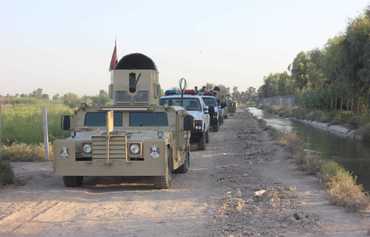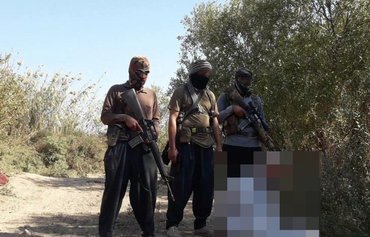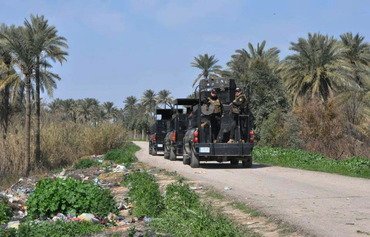Additional military reinforcements have been deployed in Diyala province, Iraqi officials announced Monday (November 16th), in a move to strengthen security after a series of terror attacks and acts of violence.
Diyala has been seeing a rise in ISIS attacks by holdouts concentrated in villages in Khanaqeen district, northern al-Muqdadiya and Baquba's al-Abbara district, Diyala governor Muthanna al-Tamimi told Diyaruna.
ISIS remnants have infiltrated the province's orchards and the outskirts of cities, taking shelter there, "after managing to escape from the intense security campaigns and pressures on them in neighbouring provinces", he said.
Security crackdowns have targeted ISIS remnants in Salaheddine and Kirkuk.
![Iraqi military units search for ISIS hideouts in agricultural villages around the town of Abu Saida in Diyala province on March 28th. [Photo courtesy of Iraqi Ministry of Defence]](/cnmi_di/images/2020/11/16/27029-Abu-Saida-Diyala-600_384.jpg)
Iraqi military units search for ISIS hideouts in agricultural villages around the town of Abu Saida in Diyala province on March 28th. [Photo courtesy of Iraqi Ministry of Defence]
"The rise in terrorist activity has pushed us to send appeals to the federal government calling for urgent measures to ensure stability and security," al-Tamimi said.
The government has responded to the demands, he said, noting that during its November 11th meeting, the Ministerial Council for National Security discussed strengthening security measures in Diyala.
Prime Minister Mustafa Khademi heads the council.
A high-level security delegation that included officials from the Interior Ministry, the Joint Operations Command and Military Intelligence arrived in Diyala on Saturday to review the security situation, al-Tamimi said.
The local government gave the delegation a detailed presentation regarding the nature of the terror threats and security challenges, and a new deployment plan was launched, he said.
This includes bringing in forces from Baghdad to support security forces already stationed in the province, al-Tamimi said.
Military reinforcements arrive
Military reinforcements arrived in the province Sunday under the supervision of Interior Minister Othman al-Ghanimi, he said, and "deployed, as an initial stage, at the entrances and exits of the town of Abu Saida and its villages".
This is the area where "security is the most complex", al-Tamimi noted, "with terrorist groups operating with force and taking advantage of the dense orchards and complex geography".
Ongoing tribal disputes contribute to the problem, he said, as does the proliferation of weapons outside state control.
Additional units will join in a few days to serve as a reserve for the forces currently deployed in the area, he said.
These include the Interior Ministry's rapid response forces, Diyala police command, the army's 5th Division, and popular and tribal mobilisation forces.
The deployment plan aims to "provide sufficient forces to conduct intensive surprise security operations against terrorist hideouts in agricultural and rugged areas [and] to close their infiltration pathways", he said.
Efforts will focus on gaining full control of the border areas with Salaheddine, he said, and on stepping up "quality intelligence work".
An additional goal is "curbing the impact of tribal groups disobeying the law and the state", he said, noting that some groups have been accused of carrying out attacks or assassinations motivated by revenge or on sectarian grounds.

![Iraqi military commanders take part in a Sunday (November 15th) security meeting to discuss a plan to reinforce military units in Diyala. [Photo courtesy of Diyala Police Command]](/cnmi_di/images/2020/11/16/27028-Security-meeting-Diyala-600_384.jpg)






